Hair fall is a common concern among teenagers, both males and females. While some hair loss is normal, excessive hair fall can be a sign of an underlying issue. In this blog post, we will discuss the common reasons for hair fall in teenagers, as well as possible solutions for this problem.
Common reasons for hair fall in teenagers
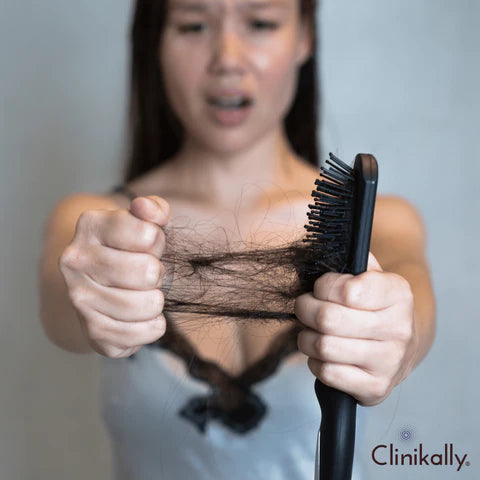
Teenagers may experience hair loss or fall for a variety of causes; appropriate management requires determining the underlying cause. Teenagers frequently experience hair loss for the following reasons:
-
Hormonal changes: During puberty, the body goes through several changes, including hormonal fluctuations. These changes can cause hair loss in both males and females.
-
Nutritional deficiencies: A diet lacking in essential nutrients can contribute to hair loss in teenagers. Iron, zinc, and vitamin D are important for hair health.
-
Stress: High levels of stress can cause hair loss in teenagers.
-
Genetics: Some teenagers may be predisposed to hair loss due to their family history.
-
Certain medical conditions: Certain medical conditions such as thyroid disorders or autoimmune diseases can cause hair loss in teenagers.
If you are facing an underlying hair fall and hair thinning condition it is important to see a doctor. At Clinikally, you can get the best online dermatologist consultation from leading skin care experts in India and get personalized treatment plan delivered directly to your doorstep.
Causes of hair fall in teenage males
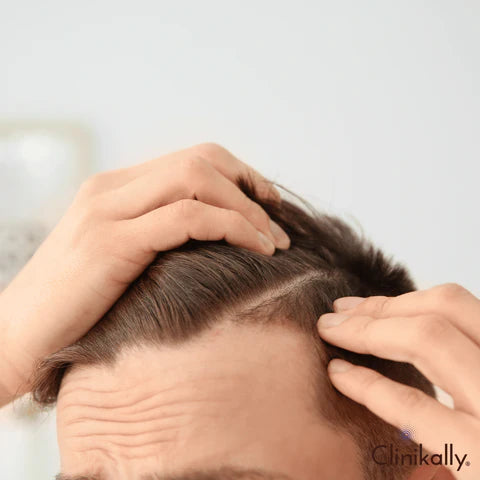
There are various reasons why teenage males experience hair loss, and understanding these reasons is crucial to finding a solution. Teenage guys frequently experience hair loss for the following reasons:
-
Male pattern baldness: Male pattern baldness is a common cause of hair loss in teenage males. It is a genetic condition that causes the hair to thin and eventually fall out.
-
Hormonal changes: Testosterone levels can increase during puberty, which can lead to hair loss in teenage males.
It is frequently necessary to have a medical practitioner, especially a dermatologist or other specialist in hair and scalp health, evaluate the reason of hair loss in male teenagers. Determining the underlying cause and the best course of treatment can be aided by performing a comprehensive examination, taking into account medical history and other relevant aspects. It is best to consult a professional for an accurate diagnosis and treatment of teenage male hair loss.
Causes of hair fall in teenage females
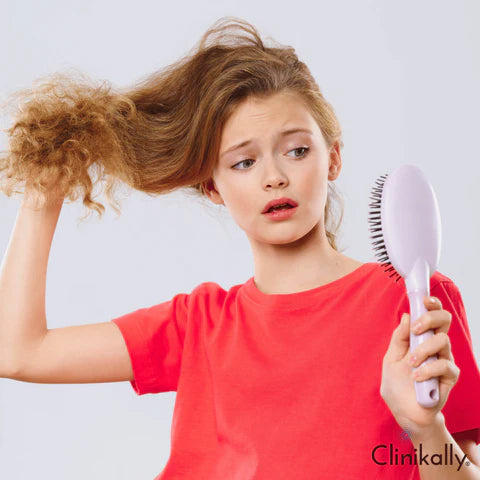
Teenage girls' hair loss or fall can be upsetting, and several things might cause this problem. Various factors can lead to hair loss in teenage girls, such as:
-
Hormonal changes: The hormonal fluctuations that occur during adolescence can cause hair loss.
-
Stress: Stressful events such as exams or emotional upheaval can cause hair loss.
-
Nutritional deficiencies: A lack of essential nutrients such as iron, zinc, and protein can lead to hair loss.
-
Genetics: Hair loss can be inherited from one's parents.
-
Medications: Certain medications such as birth control pills, antidepressants, and blood pressure medications can cause hair loss.
-
Scalp conditions: Scalp conditions such as dandruff, eczema, and psoriasis can cause hair loss.
-
Hairstyling practices: Using tight hairstyles such as braids or ponytails and overusing heat-styling tools can lead to hair loss.
A dermatologist or other healthcare practitioner with expertise in hair and scalp health may be necessary to determine the precise reason for hair loss in teenage girls. The underlying cause and the best course of treatment can be ascertained with the aid of a comprehensive examination, taking into account medical history and other aggravating circumstances. It is best to consult a professional for an accurate diagnosis and treatment of teenage girls' hair loss.
Impact of nutrition on teenage hair health

A healthy diet is essential for maintaining general health, which includes healthy hair and scalp, particularly during adolescence, when the body is going through a lot of growth and development. Sufficient nutrients promote the health, strength, and development of hair. The following is how diet affects the health of teenage hair:
-
Protein: Protein makes up the majority of hair, so getting enough protein in your diet is necessary for good hair growth. Incorporate foods such as dairy, eggs, fish, lean meats, legumes, nuts, and seeds into your diet.
-
Iron: Hair loss may result from an iron deficiency. Iron-rich foods such as red meat, chicken, fish, lentils, beans, and fortified cereals should be consumed in sufficient amounts, especially by teenage girls.
-
Omega-3 Fatty Acids: These beneficial fats promote hair development and a healthy scalp. Omega-3 fatty fish (salmon, mackerel), flaxseeds, chia seeds, and walnuts are among the sources.
-
Vitamins: The following vitamins are essential for normal hair growth:
-
Vitamin A: Promotes sebum production, which is necessary for a healthy scalp. Carrots, sweet potatoes, spinach, and kale all contain it.
-
Vitamin C: An antioxidant that promotes collagen production and is essential for hair structure. Citrus fruits, berries, and bell peppers are all high in vitamin C.
-
Vitamin E: Promotes scalp health and circulation. Almonds, sunflower seeds, spinach, and avocados contain it.
-
Vitamin D: This vitamin is essential for hair follicle cycling and growth. Sunlight, fatty fish, and fortified foods are all sources.
-
Biotin: Vitamin-B7 that is essential for hair growth and overall hair health. Eggs, nuts, seeds, and whole grains are all good sources.
-
Zinc: Promotes hair growth and repair. Zinc can be obtained by teenagers through foods such as lean meats, poultry, seafood, nuts, seeds, and whole grains.
-
Water: Staying hydrated is essential for overall health, including hair health. Hydration aids in the preservation of hair moisture and scalp health.
-
Avoiding Excessive Junk Food: A diet high in processed foods, sugary snacks, and unhealthy fats may be detrimental to hair health. A nutrient-dense, well-balanced diet is essential.
-
Balanced Diet: Encouraging a diet rich in nutrients from fruits, vegetables, whole grains, lean proteins, and healthy fats promotes overall health and, as a result, hair health.
Teenagers must eat a well-balanced diet rich in nutrients to support their growth and overall health, including healthy hair. If teenagers are concerned about their hair health or nutrient intake, they can seek personalised advice and guidance from a healthcare professional or registered dietitian.
Stress and its effect on teenage hair loss
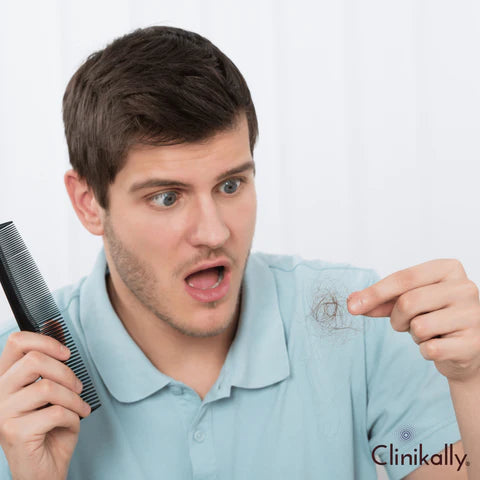
Stress can have a variety of effects on the body, including affecting hair health and potentially contributing to teen hair loss. While some stress is normal, chronic or severe stress can cause or exacerbate hair loss in susceptible individuals. Here's how stress can contribute to adolescent hair loss:
-
Telogen Effluvium: Prolonged stress can cause a significant number of hair follicles to enter a resting phase (telogen phase). This condition, known as telogen effluvium, causes excessive shedding and hair thinning, which is often visible months after the stressful event.
-
Alopecia Areata: Stress is thought to be a potential trigger for autoimmune conditions such as alopecia areata, in which the immune system attacks hair follicles, resulting in patchy hair loss.
-
Trichotillomania: This is a psychological condition in which people have an uncontrollable urge to pull out their hair, resulting in noticeable hair loss. Stress can aggravate the symptoms of trichotillomania.
-
Hormonal Imbalance: Prolonged stress can disrupt hormonal balance, causing changes in the body that may contribute to hair loss.
-
Scalp Conditions: Stress can aggravate existing scalp conditions such as seborrheic dermatitis or psoriasis, which can lead to hair loss if left untreated.
Stress can cause teen hair loss, but other factors to consider include heredity, dietary deficiencies, hormonal shifts, underlying medical disorders, or poor hair care habits. Stress management is important for general health and may lessen its effects on hair. Stress levels can be lowered by promoting stress-relieving hobbies, physical activity, relaxation methods (yoga, meditation), enough sleep, and seeking out support from friends, family, or counsellors. Consultation with a dermatologist, trichologist, or other healthcare provider can help identify the underlying cause of substantial hair loss or thinning hair in teenagers and offer suitable treatment options and guidance. Managing and enhancing hair health requires addressing the underlying causes of stress and hair loss.
How to prevent alopecia in teenagers
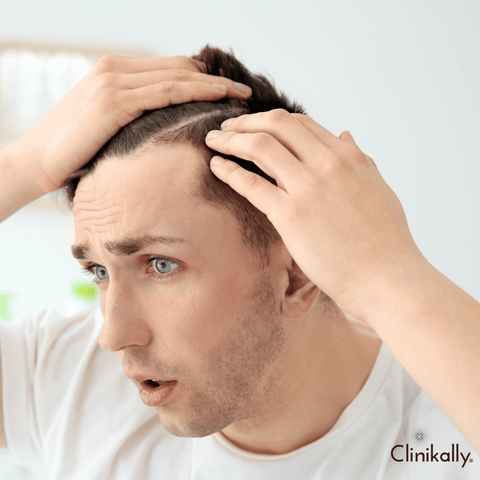
Teenage alopecia can be avoided by adopting healthy lifestyle habits and addressing any potential risk factors. While there are some alopecia causes that are unavoidable, such as genetics, there are steps you may take to reduce the likelihood or severity of hair loss. Teenagers can avoid alopecia by following these tips:
-
Maintain a healthy diet: Ensure that your diet includes essential nutrients such as iron, zinc, and vitamin D which are important for hair health.
-
Minimize stress: Practice stress-relieving activities such as yoga, meditation, and exercise.
-
Avoid harsh hair treatments: Avoid using harsh hair treatments such as dyes, perms, and straighteners which can cause damage to the hair.
-
Visit a doctor: If you suspect that you have alopecia or any other underlying medical condition, visit a doctor for a proper diagnosis and treatment.
These lifestyle changes can help preserve general hair health and lessen the risk or severity of specific forms of teen hair loss, even though not all alopecia can be prevented. Teenage alopecia must be prevented or managed by determining and treating any underlying causes or possible triggers.
Essential vitamins and minerals for hair growth

Several vitamins and minerals are necessary for healthy hair growth. These nutrients can help you have strong, healthy hair if you consume enough of them. Here are some of the most important vitamins and minerals for hair growth:
-
Biotin (Vitamin B7): Biotin is required for the production of keratin, a protein that serves as the structural foundation of hair. It is found in eggs, nuts, seeds, and leafy greens and promotes healthy hair growth.
-
Vitamin A: Aids in the production of sebum, an oily substance that keeps the scalp moisturised. Sweet potatoes, carrots, spinach, and kale are all high in vitamin A.
-
Vitamin C: An antioxidant that promotes collagen production, which is essential for hair structure. Citrus fruits, berries, kiwi, bell peppers, and broccoli are all high in vitamin C.
-
Vitamin D: Promotes hair follicle cycling and may aid in hair growth. Sources include sunlight, fatty fish, fortified foods, and supplements.
-
Vitamin E: Aids in the improvement of blood circulation and the maintenance of a healthy scalp. Vitamin E-rich foods include almonds, sunflower seeds, spinach, and avocados.
-
Iron: Iron is essential for the proper functioning of hair cells and the growth of hair. Red meat, poultry, fish, lentils, beans, and fortified cereals are all good sources of iron.
-
Zinc: Promotes hair growth and repair. Zinc is found in a variety of foods, including lean meats, poultry, seafood, nuts, seeds, and whole grains.
-
Omega-3 Fatty Acids: These acids are necessary for scalp health and hair growth. Fatty fish (salmon, mackerel), flaxseeds, chia seeds, and walnuts are good sources.
-
Vitamin B Complex (B3, B5, B6, B12): Required for good hair health. B vitamins are found in whole grains, meat, fish, poultry, dairy products, legumes, and leafy greens.
-
Copper: Aids in the production of melanin, the pigment found in hair. Nuts, seeds, whole grains, and shellfish are examples of copper-rich foods.
To support overall health and hair growth, it is critical to eat a well-balanced diet that includes a variety of these nutrients. In cases where deficiencies are suspected or there are specific concerns about hair health, consulting a healthcare professional or registered dietitian can provide personalised advice and guidance regarding dietary changes or supplements to support healthy hair growth.
Effective scalp care routines

Maintaining a proper scalp care routine is critical for overall hair health. Here's a good scalp care routine to follow to keep your scalp healthy:
-
Frequent Washing: Use a mild shampoo that is appropriate for your hair type to cleanse your scalp regularly. Depending on your hair type and scalp's oiliness, try washing your hair every two to three days. Avoid drying out your scalp by using lukewarm water.
-
Scalp Massage: Gently massage your scalp while shampooing to stimulate blood circulation, promote hair growth, and remove dead skin cells. To avoid irritation, use your fingertips in a circular motion.
-
Choose the Right Products: Choose shampoos and conditioners that are appropriate for your scalp type, whether it is oily scalp, dry, sensitive, or prone to dandruff. Look for "gentle," "sulfate-free," "paraben-free," or "pH-balanced" products.
-
Conditioning the Hair and Scalp: To prevent buildup, apply conditioner to the lengths and ends of your hair, avoiding direct application to the scalp. Use a lightweight, scalp-friendly conditioner for extra hydration.
-
Rinsing Thoroughly: To avoid product buildup, which can exacerbate scalp problems, make sure you rinse shampoo and conditioner from your hair and scalp completely.
-
Steer clear of hot water and heat styling: Hot water can deplete the scalp's natural oils, causing it to become dry. The use of hot styling tools that can irritate or led to dry scalp should be minimised.
-
Protect from the Sun: If you are going to be in the sun for a long time, use SPF-containing hair products or wear a hat to protect your scalp from sun damage.
-
Avoid Harsh Chemical Treatments: As they can harm the scalp and hair follicles, avoid using harsh chemical treatments like relaxers, dyes, or perms.
-
Healthy Eating and Hydration: Eat a nutritious diet and stay hydrated. A healthy body, including the scalp, promotes healthy hair growth.
-
Avoid Excessive Scratching or Touching: Avoid scratching your scalp excessively, as this can irritate. Try not to over-brush or over-style your hair, as this can cause scalp stress.
-
Regular Scalp Treatments: To moisturise, exfoliate, or address specific scalp concerns, consider using natural oils or specialised scalp masks regularly.
-
Consult a Professional: For proper diagnosis and treatment of persistent scalp issues such as excessive dryness, flakiness, itching, or hair loss, consult a dermatologist or trichologist.
Remember that consistency is essential for maintaining a healthy scalp. Adjust your routine to meet the needs of your scalp, and if you are introducing new products, perform patch tests to rule out any negative reactions.
Importance of regular hair care practices
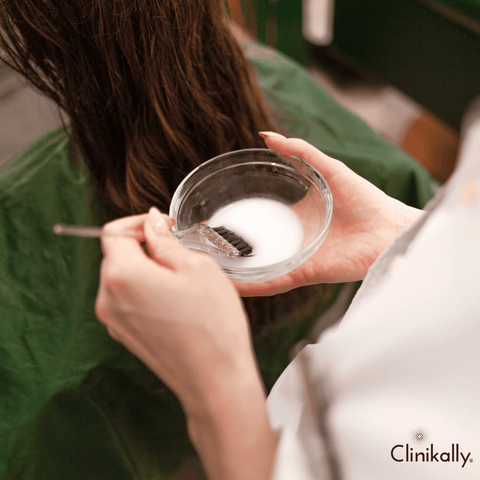
Maintaining healthy hair and scalp requires regular hair care practises. Consistency in hair care promotes its overall health, strength, and appearance. Here are some of the reasons why regular hair care is essential:
-
Promotes Scalp Health: Regular washing and cleansing help remove dirt, oil, and product buildup from the scalp, preventing clogged pores and potential scalp issues like dandruff, itching, or infections.
-
Controls Oiliness: Regular washing prevents greasiness and maintains a balanced scalp environment by controlling excessive oil production on the scalp.
-
Prevents Buildup: Using styling products, conditioners, or treatments on the hair and scalp over time can result in product buildup. Regular cleansing keeps this buildup at bay, resulting in healthier hair.
-
Improves Hair Strength and Elasticity: Conditioning and using hair masks regularly can strengthen hair strands, reduce breakage, and improve hair elasticity.
-
Helps Hair Growth: A clean, healthy scalp creates an ideal environment for hair growth. Proper care can promote hair growth by increasing blood circulation to the scalp.
-
Manages Dryness and Hydration: Conditioning and moisturising treatments regularly help hydrate dry hair, reducing brittleness and preventing split ends.
-
Maintains Hair Appearance: Consistent care, such as trimming split ends, can improve the overall appearance of hair, making it look healthier, shinier, and more manageable.
-
Prevents Scalp Conditions: Regular care practises, combined with a healthy diet and adequate hydration, contribute to a healthy scalp, lowering the likelihood of scalp conditions such as seborrheic dermatitis or psoriasis.
-
Reduces Damage: Avoiding harsh treatments, excessive heat styling, and protecting hair from environmental factors through regular care practises can reduce damage and breakage.
-
Boosts Confidence: Having healthy, well-maintained hair often leads to increased confidence and a positive self-image.
Developing a consistent hair care routine that suits your needs, lifestyle, and hair type is crucial. It's also critical to remember that overdoing some activities, like extreme heat style or washing, can backfire. The secret to keeping healthy, gorgeous hair is striking the correct balance and using the right tools and methods. A hairstylist or dermatologist can offer you individualised counsel and guidance if you're unclear about the ideal practices for your particular hair type or if you have ongoing hair difficulties.
Stop your receding hairline in teenage years!
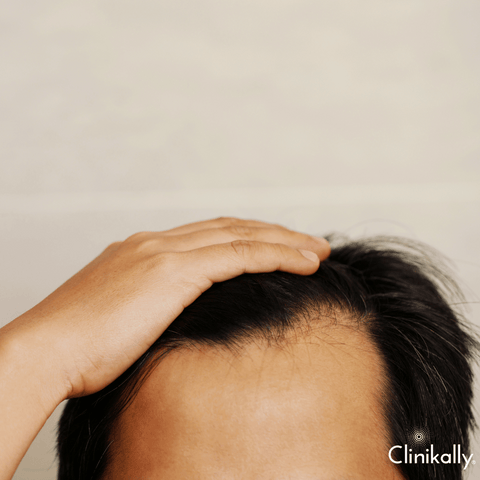
Teenage receding hairlines need to be addressed with a multimodal strategy that includes lifestyle modifications, good hair care, and occasionally medical intervention. It's crucial to remember that it might be difficult to completely cure some forms of hair loss, particularly those inherited varieties. On the other hand, the following actions could aid in controlling or delaying a receding hairline:
-
Use gentle hair care products: Use gentle hair care products that are formulated for your hair type.
-
Avoid hairstyles that pull on the hair: Avoid hairstyles such as tight ponytails or braids that pull on the hair.
-
Maintain a healthy lifestyle: Maintaining a healthy lifestyle by eating a balanced diet, getting enough sleep, and exercising regularly can help prevent a receding hairline.
-
Consult a doctor: If you have concerns about your receding hairline, consult a doctor or a hair specialist.
In conclusion, hair fall and hair thinning are common concerns among teenagers. Understanding the causes of hair loss can help in finding the right solution. Maintaining a healthy diet, minimising stress, avoiding harsh hair treatments, and consulting a doctor are some ways to prevent hair loss and promote hair growth. Remember that hair loss is a normal process, but if you experience excessive hair fall or hair thinning, it's best to consult a doctor.
Hair growth stimulating products for teenagers
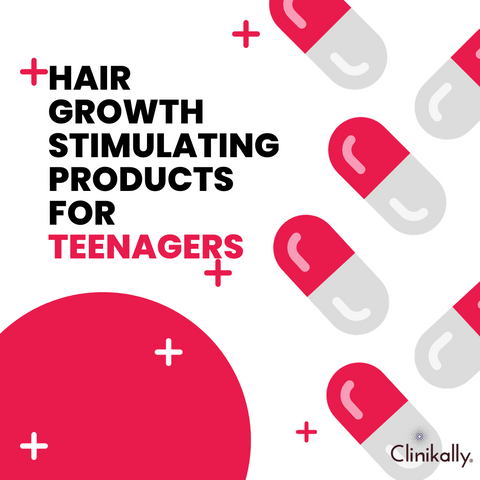
There are a few items that teenagers might think about if they want to maintain healthy hair or encourage hair development. It's crucial to remember that each person may react differently to these products, and it's best to speak with a dermatologist or other healthcare provider before taking any particular product. Here are a few choices:
-
Biotin Supplements: Biotin is a B vitamin that promotes the health of your hair, skin, and nails. Biotin supplements are widely available and can help support hair growth, particularly if a deficiency exists.
-
Minoxidil: The FDA has approved minoxidil as an over-the-counter topical medication to encourage hair growth. It is generally recommended for people who have pattern baldness or thinning hair, and some teenagers may use it under medical supervision.
-
Scalp Serums and Treatments: Scalp serums and treatments contain ingredients such as peptides, antioxidants, and botanical extracts that claim to stimulate hair growth and improve scalp health. Look for products that are intended to promote hair growth or strengthen hair follicles.
-
Shampoos and Conditioners for Hair Growth: Some hair care products contain ingredients such as caffeine, keratin, or botanical extracts that claim to support hair growth or reduce hair loss. Look for shampoos and conditioners that are designed to stimulate hair growth.
-
Essential Oils: Some essential oils, such as those derived from rosemary, peppermint, or cedarwood, are thought to promote hair growth. These hair oils can be applied to the scalp in diluted form, but care should be taken to prevent skin irritation.
-
Vitamin Supplements: When taken as part of a balanced diet, multivitamins or supplements containing important vitamins and minerals like zinc, vitamin D, biotin, and vitamin E may support overall hair health.
-
Natural Remedies: Using natural ingredients like castor oil, coconut oil, or aloe vera in homemade masks or treatments may help to maintain the health of the scalp and encourage healthier hair growth.
It's important to be aware of any possible adverse effects before using any product that stimulates hair growth, especially for youngsters. Always read the directions carefully, do patch tests to check for allergic reactions, and think about consulting a dermatologist or other healthcare provider, especially if you have young children and are having hair issues. Teenagers' ability to sustain healthy hair growth also depends on treating any underlying medical conditions or nutritional inadequacies.
Lifestyle changes to combat hair thinning

Combating hair thinning requires a comprehensive approach that includes lifestyle changes aimed at improving overall health as well as hair care practises. Here are some lifestyle changes that may help with hair thinning:
-
Balanced Diet: Eat a well-balanced diet rich in essential nutrients such as proteins, vitamins (particularly biotin, vitamins A, C, D, and E), minerals (such as iron and zinc), and omega-3 fatty acids. These nutrients promote hair growth and health.
-
Hydration: To maintain overall health and hair hydration, drink plenty of water daily.
-
Manage Stress: Chronic stress can contribute to hair thinning or loss. Reduce stress by engaging in stress-relieving activities such as meditation, yoga, deep breathing exercises, or hobbies.
-
Regular Exercise: Exercise improves overall circulation and helps maintain a healthy scalp by increasing blood flow, which can support hair follicles.
-
Avoid Harsh Hair Treatments: Limit or avoid harsh treatments such as overheating, chemical treatments (bleaching, perming), or tight hairstyles that can cause hair breakage and thinning.
-
Hair Care Routine: Use gentle, sulfate-free shampoos that are appropriate for your hair type. Excessive shampooing and harsh hair treatments can harm the hair and scalp.
-
Scalp Massage: Massage your scalp regularly to increase blood flow, stimulate hair follicles, and promote healthier hair growth.
-
Avoid smoking and drink in moderation: Smoking can hurt hair health and circulation. Limiting alcohol consumption can also help with overall health, which benefits hair indirectly.
-
Adequate Sleep: Make sure you are getting enough quality sleep because it helps with overall well-being and promotes healthy hair growth.
-
Medical Exam: Hormonal imbalances or underlying medical disorders may occasionally be the cause of hair thinning. Consult a doctor to rule out any medical issues that may be causing hair loss.
-
Supplements: Consult a healthcare professional before taking supplements if you have nutritional deficiencies or if supplements could help with overall hair health.
-
Consultation with a Dermatologist: If you have persistent hair thinning or have concerns, consulting with a dermatologist or trichologist can provide personalised advice, diagnosis, and treatment options.
A mix of lifestyle modifications, good hair care techniques, preserving general health, and attending to any underlying problems causing hair loss are frequently used to combat hair thinning. Results may differ, but keeping healthy habits consistently is essential to witnessing long-term benefits in hair health.
































